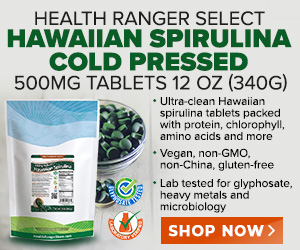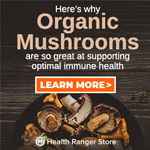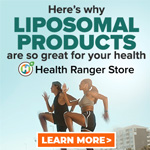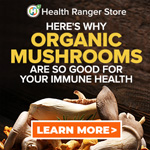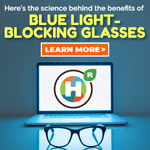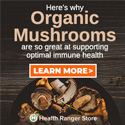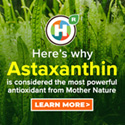
Food labels should list all fats to help cut heart disease, say experts (press release)
Thursday, September 28, 2006 by: NewsTarget
Tags: health news, Natural News, nutrition
- China's COVID nightmare returns: Students isolated, deaths hidden as regime doubles down on totalitarian policies
- CDC wants plane travel LOCKDOWN for all humans who haven't received the toxic MEASLES PLANDEMIC VACCINE, even though vaccines don't work
- Forgotten food survival secrets: How ancient preservation techniques can save your family when modern systems fail
- Axis of Evil: CDC and FDA concealed COVID vaccine dangers as injuries soared, new study reveals
- China' rocket fuel DUMP over 7 U.S. states adds to chemical chaos from chemtrails that sicken citizens and fuel sick care industry
- New, weaponized fluoride study ignores BRAIN DAMAGE while pushing forced medication of water
- Unlocking nature’s arsenal: The definitive guide to dietary supplements in the fight against cancer
- Massive Saharan dust plume the size of the U.S. barrels toward Florida, triggers health warnings
- Much anticipated “MAHA Report” is riddled with AI hallucinations and false citations: MULTIPLE VACCINE ISSUES sidelined in botched White House health initiative
- Mount Etna erupts in fiery spectacle, forcing tourists to flee as ash plume reaches 4 miles high
- Silent invasion: Oral inflammation's role in systemic disease, from gum disease to heart health
- Trends forecaster Gerald Celente warns of global financial collapse and calls for cultural renaissance
- China-funded group behind New York's $75B climate law sparks national security alarms
- Daily vitamin D may add years to your healthspan by preserving DNA, research reveals
- “Healing Revolution” on BrightU: The silent epidemic fueling chronic illness and the suppression of natural healing
- The Trump-Palantir coup: How the company's stance on privacy for American citizens is under threat
- Federal authorities bust $25M COVID-19 relief fraud scheme, arrest 14 conspirators
- FDA and CDC to replace 80% of staff with AI agents to ‘Streamline’ operations - critics warn of depopulation agenda
- BEWARE: USDA allows genetically engineered vaccines to infiltrate organic food production
- Globalists call for “celebration” of plunging human fertility as war against humanity accelerates
- Holistic eye care and ancient practices challenge surgery’s reign in cataract treatment
- Biden administration targeted mask and vaccine opponents as "terrorists," new docs reveal
- Key to aging gracefully, SUNLIGHT provides vitamin D, boosts nitric oxide, and preserves telomeres
- Amazing microscopy photos reveal how freezing crystals attempt to mimic electronic structures they are touching
- Unlocking methylene blue: A century-old compound steps into the cancer spotlight
- HEALTH SECRETS: How to Instantly Block MSG Toxicity Using Natural Substances (and the secret of Methylene Blue)
- LYME DISEASE on the RISE raising suspicion it's still part of U.S. military bioweapons program gaining traction for Lyme Disease PLANDEMIC
- MSG EXPOSED: Hidden Neurotoxins Found in Groceries, Snacks and Popular Fast Food Menus
- Morphic resonance “remote viewing” reveals iconic Middle East images of stealth bombers, a falcon and a one-horned ram
- Is Del Bigtree leaving MAHA? Bigtree blasts the MAHA report's shocking silence on vaccine failure and vaccine injury
- Vietnam moves to block Telegram messaging app over claims of “anti-state” content and illegal activity
- Breaking the aging code: How diet shapes longevity from breakfast onward
- WAR ON COGNITION: The Coordinated Assault on Your Brain and How to Defend Yourself Against Every Attack
- Study: Methylene blue and near-infrared light show promise in preventing brain degradation
- Sodium-ion battery BREAKTHROUGH offers a faster, safer, and more sustainable revolution in energy storage
- A closer look at the corporate influences steering the CDC and manipulating US health policy
- WAR ON COGNITION: The Coordinated Assault on Your Brain and How to Defend Yourself Against Every Attack
- Big Pharma's Dirty Secret: How Prescription Drugs Are Starving Your Body of Essential Nutrients
- RED ALERT: Nuclear War Between India and Pakistan Could Trigger Global Catastrophe… full RISK ANALYSIS
- Singapore's draconian vaccine mandate: Citizens face jail time for refusing FORCED medical procedures that do HARM
- MSG EXPOSED: Hidden Neurotoxins Found in Groceries, Snacks and Popular Fast Food Menus
- HEALTH SECRETS: How to Instantly Block MSG Toxicity Using Natural Substances (and the secret of Methylene Blue)
- Globalists call for “celebration” of plunging human fertility as war against humanity accelerates
- JESUS NEVER SPOKE ENGLISH: Historical facts on why the Bible you’re probably reading has been altered, redacted or hidden from much of its original meaning
- Landmark study of 85 million reveals shocking surge in heart attacks, strokes, and sudden death following the notorious COVID-19 jab
- BEWARE: USDA allows genetically engineered vaccines to infiltrate organic food production
- Silent catastrophe: COVID-19 vaccines linked to plummeting fertility rates, Czech data reveals
- Doctors are still puzzled about “long vax,” a set of symptoms linked to COVID-19 vaccines
- Why All Government Officials and Big Tech CEOs Who Engage in Systematic Viewpoint Censorship Must Be ARRESTED, Prosecuted, and Sentenced to Life in Prison
- WHO Pandemic Treaty sparks sovereignty concerns amid secretive voting and U.S. withdrawal
- Canada's COVID cover-up: Health officials swore secrecy to protect Trudeau from vaccine scandal
- Brushing with poison: Study finds toxic heavy metals in 90% of toothpaste brands, including those for children
- Head of L.A. Port warns of incoming plunge in U.S. supply chain, empty shelves and inventory depletion in 5-7 weeks
- Shocking study reveals cell phone radiation causes BLOOD CLUMPING in minutes
- Red Cross issues warning to stop blood plasma donations from vaccinated people
- Scientists confirm: GENIUS brain function can be spontaneously unleashed in humans without any apparent cause
- EPA advisor admits the agency is funneling billions to climate groups ahead of Trump’s return to White House
- HYSSOP: What research reveals about the health benefits of this ancient holy herb
- Two containers with completed ballots fall out of truck in Florida
- Newly released JFK files reveal Pentagon's role in creating Lyme disease and covid in the same lab
- Mike Adams releases country western hit single: Goin’ Back in Time is Comin’ Home
- Global leaders unite to clamp down on “misinformation” with UN-backed Cascais Declaration
- BREAKING: 2025 NDAA authorizes mandatory military draft of WOMEN across America… as Pentagon pursues global NUCLEAR war with both Russia and China at the same time
- I Want My Bailout Money – new song released by Mike Adams
- Michael Yon warns of a ZIONIST TAKEOVER in Trump’s second administration
- Ozempic and Wegovy weight loss drugs are injectable LIZARD VENOM PEPTIDES that may unleash a devastating wave of organ failure… side effects align with symptoms of SNAKE BITES
- BOMBSHELL: DNA testing kits are a SCAM to develop ethnic-specific bioweapons
- The Health Ranger releases “Vaccine Zombie” song and music video, using AI-animated zombies for the music video
- These 13 countries just signed an agreement to engineer a global FAMINE by destroying food supply
- Israeli soldiers accused of even more torture and abuse in the West Bank
- RFK Jr. clears key hurdle: Sen. Susan Collins backs controversial HHS nominee, signaling a new era for health policy
- Sermon 30: How Jesus reveals Caesar’s FAKE CURRENCY and FALSE AUTHORITY
Trans fats (also known as trans fatty acids) are solid fats found in margarines, biscuits, cakes, and fast food. Scientists think that our bodies deal with these fats in the same way as saturated fats.
Both saturated fats and trans fats increase the amount of low density lipoprotein (LDL) or 'bad cholesterol' in the blood and reduce the amount of high density lipoprotein (HDL) or 'good cholesterol.' People with high levels of LDL cholesterol tend to have a higher risk of getting heart disease, while people with high levels of HDL cholesterol tend to have a lower risk.
A recent analysis of all the evidence recommended that people should reduce or stop their dietary intake of trans fatty acids to minimise the related risk of coronary heart disease.
This analysis found a 2% increase in the energy intake from trans fatty acids was associated with a 23% increase in the occurrence of coronary heart disease. In fact, the authors noted that the harmful effects of trans fatty acids were seen even when intake was really low, only 3% of total daily energy intake (20-60 calories), about 2-7 g for a person consuming 2000 calories per day.
Legislation introduced in Denmark in 2004 mandated that all oils and fats used in locally made or imported foods must contain less than 2% industrially produced trans fatty acids. This virtually eliminated trans fatty acids and had no effect on quality, cost, or availability of foods.
And in January 2006 the US Food and Drug Administration mandated that all food manufacturers provide the content of trans fatty acids and cholesterol in addition to saturated fat on nutrition labels for all manufactured foods, write the authors.
The UK Food Standards Agency is currently pressing for revision of the European directive that governs the content and format of nutrition labels on foods marketed in the United Kingdom and other European countries, so that these fats are labelled.
They believe that mandatory addition of the content of saturated fat and trans fatty acids to nutrition labels would enable consumers to make healthier food choices that could lower LDL concentrations and reduce the risk of coronary heart disease and other vascular events.
Contact: Emma Dickinson edickinson@bmj.com 44-020-738-36529 BMJ-British Medical Journal
Health news at FETCH.news
Get independent news alerts on natural cures, food lab tests, cannabis medicine, science, robotics, drones, privacy and more.
Take Action: Support Natural News by linking to this article from your website
Permalink to this article:
Embed article link: (copy HTML code below):
Reprinting this article:
Non-commercial use OK, cite NaturalNews.com with clickable link.
Follow Natural News on Facebook, Twitter, Google Plus, and Pinterest
Science News & Studies
Medicine News and Information
Food News & Studies
Health News & Studies
Herbs News & Information
Pollution News & Studies
Cancer News & Studies
Climate News & Studies
Survival News & Information
Gear News & Information
News covering technology, stocks, hackers, and more



"Big Tech and mainstream media are constantly trying to silence the independent voices that dare to bring you the truth about toxic food ingredients, dangerous medications and the failed, fraudulent science of the profit-driven medical establishment.
Email is one of the best ways to make sure you stay informed, without the censorship of the tech giants (Google, Apple, Facebook, Twitter, YouTube, etc.). Stay informed and you'll even likely learn information that may help save your own life."
–The Health Ranger, Mike Adams











